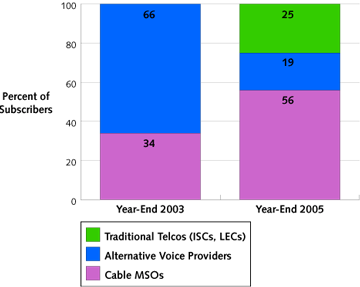 |
| Yankee Group VoIP Marketshare |
Here's a copy of the Executive Summary of the Yankee Group report. (contact Yankee Group for the full report):
Local VoIP providers can be broadly grouped into three categories: cable MSOs, major players (IXCs and RBOCs) and alternative VoIP providers. Alternative VoIP providers include the nontraditional players that are entering the telephony market with a bring-your-own-broadband strategy. These players are generally small upstarts. In the coming year, they will be facing the communications market leaders (AT&T, Verizon, Comcast and Time Warner). Can they survive? In this report, the Yankee Group will examine the competitive market to determine whether or not there is a viable long-term role for alternative VoIP providers as the local VoIP market matures.
Alternative VoIP providers such as Vonage and many of the Vonage-like providers have a first-to-market advantage. In 2003, a number of these companies, dominated by Vonage, introduced VoIP phone service to consumers. At the end of 2003, these small startups comprised nearly 66% of the local residential VoIP market. Vonage dominated the market with than 90% of all the subscribers in the alternative VoIP provider segment or 61% of the local residential VoIP market.
Alternative VoIP providers lose market share every day to the major players. MSOs, IXCs and ILECs are joining the VoIP game, and their available resources dwarf even the largest of the alternative VoIP providers. The local VoIP market is already crowded with more than a dozen players vying for local consumers. As major players accelerate their roll-out strategies, alternative VoIP providers will feel increasingly squeezed, and pricing pressure will intensify. The Yankee Group expects the alternative VoIP providers to lose 47% market share to the MSOs and IXCs/ILECs by the end of 2005.
Delivering primary-line voice service is a very resource-intensive effort. The MSOs are bringing VoIP to the mass market as a primary-line replacement. Incumbent local providers look to VoIP as a long-term network development strategy; regardless of interim activity, VoIP is part of their future. So, where will the little guys fit? Are these providers struggling to build a market that will soon leave them behind?









